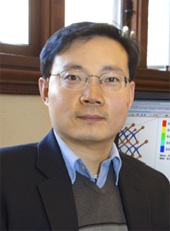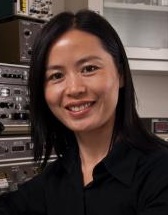With four award winners in this year’s list of 65 Early Career Research Program recipients, announced last week by DOE’s Office of Science, Berkeley Lab scores high among the institutions whose researchers have won the five-year, $2.5 million grants. Designed to support exceptional researchers during the critical stages of their formative work, the awards focus on areas of high priority for the nation and for DOE’s mission. Grants are administered by major program offices within the Office of Science.
This year well over a thousand applicants from universities and national laboratories submitted proposals. Berkeley Lab’s winners are:
 Paolo Ferracin of the Superconducting Magnet Group in the Accelerator and Fusion Research Division. Ferracin studies advanced superconducting materials, including niobium tin (Nb3Sn), for such applications as future magnets for the Large Hadron Collider and electron-cyclotron resonance (ECR) ion sources for rare isotope accelerators. His Early Career award from the Office of Nuclear Physics is for his proposal “Development of Nb3Sn Superconducting Magnets for Fourth Generation ECR Ion Sources.”
Paolo Ferracin of the Superconducting Magnet Group in the Accelerator and Fusion Research Division. Ferracin studies advanced superconducting materials, including niobium tin (Nb3Sn), for such applications as future magnets for the Large Hadron Collider and electron-cyclotron resonance (ECR) ion sources for rare isotope accelerators. His Early Career award from the Office of Nuclear Physics is for his proposal “Development of Nb3Sn Superconducting Magnets for Fourth Generation ECR Ion Sources.”
 Susannah Tringe of the Genomics Division and DOE’s Joint Genome Institute. Tringe investigates the sequencing and characterization of natural communities of microbes and their roles in processes ranging from biomass degradation to efficient production of biofuels from non-food crops. Her Early Career award from the Office of Biological and Environmental Research is for her proposal “Microbial communities in biological carbon sequestration.” (See http://jgi.doe.gov/News/news_11_05_10.html)
Susannah Tringe of the Genomics Division and DOE’s Joint Genome Institute. Tringe investigates the sequencing and characterization of natural communities of microbes and their roles in processes ranging from biomass degradation to efficient production of biofuels from non-food crops. Her Early Career award from the Office of Biological and Environmental Research is for her proposal “Microbial communities in biological carbon sequestration.” (See http://jgi.doe.gov/News/news_11_05_10.html)
 Junqiao Wu of the Materials Sciences Division, a professor of materials science and engineering at UC Berkeley. Wu studies the properties and applications of nanomaterials, including phase transitions, nanoscale photovoltaics and optoelectronics, and correlated electron behavior in reduced dimensions, such as domain walls. His Early Career Award from the Office of Basic Energy Sciences is for his proposal “Functional Domain Walls as Active Elements for Energy Technology.”
Junqiao Wu of the Materials Sciences Division, a professor of materials science and engineering at UC Berkeley. Wu studies the properties and applications of nanomaterials, including phase transitions, nanoscale photovoltaics and optoelectronics, and correlated electron behavior in reduced dimensions, such as domain walls. His Early Career Award from the Office of Basic Energy Sciences is for his proposal “Functional Domain Walls as Active Elements for Energy Technology.”
 Haimei Zheng of the Materials Sciences Division and the National Center for Electron Microscopy. Zheng investigates the fabrication, properties, and applications of complex nanostructures, which are often grown by chemical means and characterized using transmission electron microscopy (TEM). Her award from the Office of Basic Energy Sciences is for her proposal “Real Time TEM Imaging of Materials Transformations in Liquid and Gas Environments.”
Haimei Zheng of the Materials Sciences Division and the National Center for Electron Microscopy. Zheng investigates the fabrication, properties, and applications of complex nanostructures, which are often grown by chemical means and characterized using transmission electron microscopy (TEM). Her award from the Office of Basic Energy Sciences is for her proposal “Real Time TEM Imaging of Materials Transformations in Liquid and Gas Environments.”
This is the second year in a planned annual program of research awards from the Office of Science. Scientific experts outside DOE choose the winners.
For more information, see DOE’s announcement at http://science.energy.gov/news/in-the-news/2011/05-06-11/.